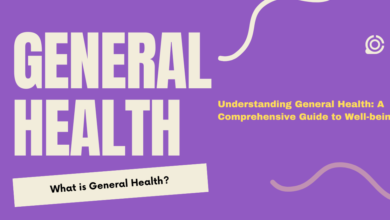Key Components of General Health: A Comprehensive Guide to Holistic Well-being

Achieving and maintaining general health is a multifaceted endeavor that involves a holistic approach to well-being. General health encompasses physical, mental, and social aspects of life, all of which are interconnected and crucial for overall wellness. Understanding and addressing these key components can help individuals lead healthier, more balanced lives. This article explores the essential components of general health and offers practical insights into fostering each aspect.
1. Physical Health
Definition: Physical health refers to the proper functioning of the body’s systems and the absence of disease or physical ailments. It involves maintaining the body’s strength, endurance, and overall functionality.
Key Elements:
- Nutrition: A balanced diet provides essential nutrients that support bodily functions. Key nutrients include carbohydrates for energy, proteins for tissue repair, fats for cell structure, and vitamins and minerals for various physiological processes. Aim to consume a variety of whole foods, including fruits, vegetables, whole grains, lean proteins, and healthy fats.
- Exercise: Regular physical activity is vital for maintaining cardiovascular health, muscle strength, flexibility, and a healthy weight. The general recommendation is at least 150 minutes of moderate-intensity aerobic exercise or 75 minutes of vigorous activity per week, combined with muscle-strengthening exercises.
- Sleep: Quality sleep is crucial for physical recovery, cognitive function, and overall health. Adults should aim for 7-9 hours of sleep per night. Establishing a consistent sleep schedule and creating a restful environment can improve sleep quality.
- Preventive Care: Regular check-ups, screenings, and vaccinations are essential for early detection and prevention of diseases. Routine visits to healthcare providers help monitor health status and manage any emerging issues effectively.
2. Mental Health
Definition: Mental health encompasses emotional and psychological well-being. It involves managing stress, maintaining a positive outlook, and addressing mental health challenges effectively.
Key Elements:
- Stress Management: Effective stress management techniques, such as mindfulness, meditation, and deep breathing exercises, help reduce the impact of stress on mental health. Identifying stressors and developing coping strategies can improve emotional resilience.
- Emotional Resilience: Building emotional resilience involves developing the ability to adapt to and recover from adversity. This can be achieved through self-awareness, positive thinking, and seeking support when needed.
- Mental Health Care: Professional counseling, therapy, and mental health services are crucial for addressing mental health issues such as anxiety, depression, and other psychological conditions. Seeking help is a proactive step toward maintaining mental well-being.
3. Social Health
Definition: Social health refers to the quality of relationships and interactions with others. Healthy social connections contribute to emotional support, a sense of belonging, and overall well-being.
Key Elements:
- Healthy Relationships: Building and maintaining positive relationships with family, friends, and colleagues supports emotional well-being. Effective communication, empathy, and mutual respect are key to nurturing healthy relationships.
- Community Engagement: Participating in community activities and social events fosters a sense of connection and purpose. Engaging in community services, clubs, or social groups can enhance social health and create meaningful interactions.
- Communication Skills: Developing strong communication skills helps in resolving conflicts, expressing needs and emotions, and building supportive relationships. Active listening and assertive communication are essential components of effective interpersonal interactions.
4. Preventive Health Measures
Definition: Preventive health measures involve proactive steps to prevent illness and maintain health before issues arise. This includes lifestyle choices and health practices that contribute to long-term well-being.
Key Elements:
- Healthy Habits: Adopting healthy habits such as regular exercise, balanced nutrition, adequate hydration, and avoiding harmful behaviors (like smoking and excessive alcohol consumption) supports overall health.
- Health Screenings: Regular health screenings for conditions like hypertension, diabetes, cholesterol levels, and cancer can help detect potential issues early and prevent progression.
- Vaccinations: Staying up-to-date with vaccinations helps protect against infectious diseases and contributes to overall health and public safety.
Practical Tips for Enhancing General Health
- Set Realistic Goals: Establish achievable health goals and create a plan to reach them. Gradual changes in diet, exercise, and lifestyle are more sustainable than drastic overhauls.
- Stay Educated: Keep informed about health practices and emerging research. Understanding how different factors affect health can help you make better decisions.
- Seek Support: Don’t hesitate to seek support from healthcare professionals, mental health counselors, or support groups. Professional guidance and social support can make a significant difference in managing health.
- Balance and Moderation: Strive for balance in all areas of life. Moderation in diet, exercise, and stress management helps maintain a harmonious and healthy lifestyle.
Conclusion
General health is a comprehensive concept that involves physical, mental, and social well-being. Addressing each key component—nutrition, exercise, sleep, stress management, emotional resilience, healthy relationships, and preventive care—contributes to overall wellness and quality of life. By adopting a holistic approach to health and making informed, balanced choices, individuals can build a strong foundation for long-term well-being and thrive in all aspects of life. Embracing a proactive and balanced approach to general health empowers individuals to lead healthier, more fulfilling lives.



